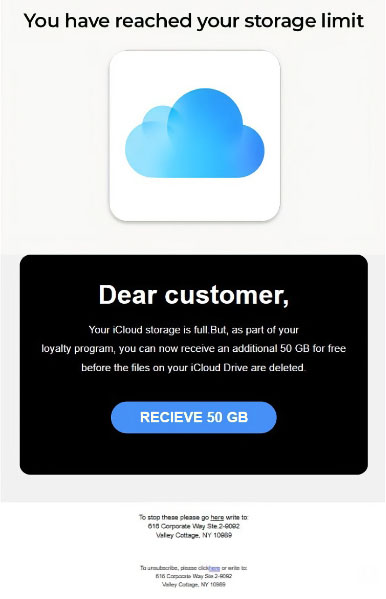Use an iPhone or Mac? Watch Out for This New iCloud Scam

Updated:

Phishing scams aimed at Apple users are on the rise again, with many receiving emails purporting to be from “iCloud Support” which are really attempts to steal their passwords, credit card numbers, and personal information.
What Do the Latest iCloud Phishing Scams Look Like?
The latest spam emails have subject lines that vary, but one common one is “Unusual activity detected on your iCloud account” which targets iPhone users across the globe. These phishing emails typically take users to a website that looks like an official Apple website, where they are directed to reset their password or account. However, this gives their Apple ID password to the scammers, exposing their digital life.
In another example, iCloud users are warned that they have reached their storage limit, but can receive extra storage for free. If you fall for this scam and inadvertently hand over your Apple ID password to scammers then this puts all of your personal data at risk, including your iCloud Photo Library, Notes, email messages if you use iCloud Mail, and even files stored in iCloud Drive.

Source: iDropNews
Once scammers have your Apple ID and password, they can use Find My on the web to track the location of all your devices, intercept your iMessages and SMS messages, and access everything in your iCloud Backups, including call history, web browsing history, and more. It can be worse than having your email account hacked.
Award-winning iPhone security
Download Certo Mobile Security for free and protect your iPhone from cyber attacks today.
How to Protect Your iCloud Account from Phishing Scams
Here are some steps you can take to protect yourself from these scams:
- Be extremely suspicious of any emails, text messages, or warnings you receive, and never click links in any emails or text messages that seem even the least bit suspicious.
- If you are concerned that there might actually be a problem, open a separate browser window and visit Apple’s website directly to log in to your Apple ID. If there is a problem with your account, Apple will bring that to your attention as soon as you log in.
- Enable two-factor authentication (2FA) on your Apple ID. This requires you to enter an additional six-digit verification code each time you log in to iCloud or another Apple site using your Apple ID. If a hacker does get your Apple ID password, the six-digit code will appear on your iPhone or iPad, and you will immediately know that something is up.
- Consider using Advanced Data Protection, which encrypts most of your iCloud data in such a way that even Apple can’t get access to it. This includes your iCloud Device backups, Messages, files in iCloud Drive, Notes, Photos, and more.
Remember, scammers are always trying to get access to your personal data, so always be vigilant and take steps to protect yourself.